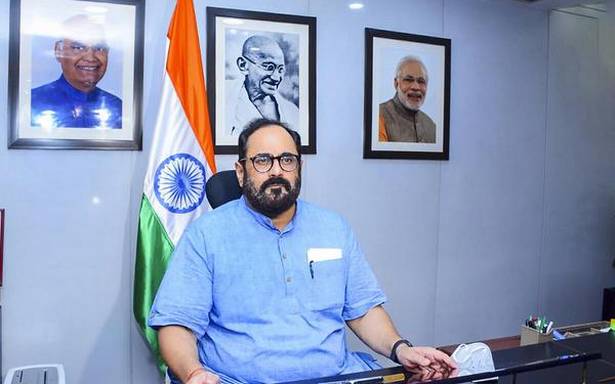Minister of State for Electronics and IT Rajeev Chandrasekhar on Monday highlighted the need for algorithm-related accountability for digital platforms, and said a discussion among industry and users can help evolve a roadmap on the matter.
The minister’s comment assumes significance amid recent whistleblower allegations that Facebook’s algorithms and systems fuelled hate speech and misinformation.
“I have personally…before I became a minister, raised this spectre of need to scrutinise algorithms. Whether that will find place in rules or new digital laws…but these are areas we have to discuss publicly, among industry and users to evolve a roadmap…,” he said in a briefing on FAQs on intermediary guidelines.
He emphasised that upholding the right to privacy and the right to free speech are as important in cyberspace.
“Algorithims that infringe Article 14, 19, 21 (of the Constitution) of any citizen is still an infringement and so our main job is to protect right to free speech, right to privacy and right to non-discrimination online just as government does offline,” he said. In cases where algorithms or any conduct of any intermediary comes in the way of users’ rights, it is a matter for the government or for law to deal with “if not today, in future”, he said.
The minister was responding to a specific query on whether the big tech companies are doing enough to address issues such as hate speech and user harm, especially in the backdrop of recent whistleblower charges against Facebook.
Recent revelations by whistleblower Frances Haugen have led to concerns that Facebook has done little to shed its ‘growth at all costs’ culture that turbocharged its rise to capture 2.91 billion monthly active users globally, including over 400 million in India.
Dangerous algorithms
Haugen, an employee of the Facebook integrity team until May 2021, leaked tens of thousands of internal documents, including many from employee discussion sites, company presentations and research papers, that have unveiled the inner workings of Facebook.
She has suggested that Facebook made changes to its “dangerous” algorithms that contributed to divisiveness in society, and realised these tweaks kept people returning to the platform. She has also filed eight complaints against the company with the US securities regulator.
Following the revelations, the Ministry of Electronics and Information Technology (MeitY) reportedly wrote to Facebook asking for information around the algorithms and processes used by the platform and sought details of steps taken to safeguard users.
As per data cited by the Indian government earlier this year, there are 53 crore WhatsApp users, 41 crore Facebook subscribers and 21 crore Instagram account holders in the country.
India enforced new IT intermediary rules earlier this year, aiming to bring greater accountability for big tech companies, including Twitter and Facebook.
The rules require social media platforms to remove any content flagged by authorities within 36 hours and set up a robust complaint redressal mechanism with an officer being based in the country.
Social media companies are required to take down posts depicting nudity or morphed photos within 24 hours of receiving a complaint.
Significant social media companies — those with over 50 lakh users — also have to publish a monthly compliance report disclosing details of complaints received and action taken as also details of contents removed proactively.

























